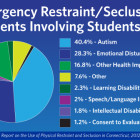State Police Take Another Look At Cold Case Murders Of Patel Family
|
The violent murders of Champaben and Anita Patel, a mother and daughter from Windsor, have been a mystery since they happened on March 21,1996. But cold case detectives from the Connecticut State Police, with the help of the Windsor Police Department, are taking another look at the evidence now, Brian Foley, the executive aide to James Rovella, who heads the state Department of Emergency Services and Public Protection, said. “Investigators from the State of Connecticut Cold Case unit had begun to give this case some additional attention pre-pandemic,” Foley said. “Now that things have settled [down], the case and its evidence are again being reevaluated…The reevaluation particularly relates to the exploration of possible resubmission of evidence as DNA science has evolved a great deal.”
The Patels’ homicide is one of the cold cases listed on the Connecticut State Police’s Cold Case website. Anita Patel, 32, was stabbed 14 times in her kitchen, and her body was burned due to gasoline being poured around her while Champaben Patel, 54, was strangled and her body was burned in her bedroom, according to the website.

